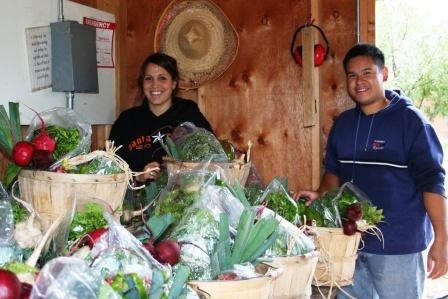Posts Tagged: Thomas Tomich
Software has the Silicon Valley, but ag technology isn't centered in one place
“With a state a thousand miles long and ecosystems ranging from rain forests to arid deserts, and cropping patterns affiliated with all those things, you will not find a single location to do what needs to be done,” said Don Klingborg, who directs the advocacy and county partnerships effort at the University of California Division of Agriculture and Natural Resources.
That’s why the university has nine extension centers across the state — someone needs to make sure that the ideas that come out of campus labs will actually work in the field, the article noted.
“Once it has gone through that and you have done the fine-tuning, then it is time to do the transfer into the private sector,” Klingborg said.
A new generation of farmers emerges
Linda DuBois, Comstock
There are a significant number of younger Californians very interested in food, and that leads them to an interest in agriculture, said UC Davis professor Tom Tomich, director of the UC's Agriculture Sustainability Institute and of the statewide UC Sustainable Agriculture Research and Education Program.
To meet this demand, UC Davis launched a new bachelor’s degree program in sustainable agriculture and food systems.
“There’s a real emphasis on experiential learning because so many of the students don’t come from a farm background,” Tomich says.
Nurturing a new crop of farmers is imperative because California agriculture is crucial to the state’s economy and to the nation’s food security, says Craig McNamara, president of the California Board of Food and Agriculture.
New college degree: “Sustainable agriculture and food systems”
The University of California, Davis, is launching a new undergraduate major — “Sustainable Agriculture and Food Systems.” The program integrates several subjects to give students an understanding of the many issues facing contemporary farming and food systems, including production, processing, distribution, consumption, and waste management.
As noted in the Los Angeles Times, “With rising public interest in where our food comes from — as well as in "green" living — it makes sense that higher education would be eager to attract students who want to tap into the intersection between these two fields.”
Students will focus on the social, economic, and environmental aspects of agriculture and food — from farm to table and beyond. The program is designed to help students obtain a diversity of knowledge and skills, both in the classroom and through personal experiences on and off campus.
Students will take courses in a broad range of disciplines, but will focus in one of three tracks: Agriculture and Ecology, Food and Society, or Economics and Policy.
“This interdisciplinary curriculum will prepare students to become leaders in agriculture and food systems,” said professor Thomas Tomich, the major adviser for the program and director of the Agricultural Sustainability Institute at UC Davis.
The major is new, but UC Davis has been covering the subject in field- and classroom-based interdisciplinary learning opportunities at the Student Farm at UC Davis for more than 35 years, said Mark Van Horn, the Student Farm director who will teach a core course in the major.
“Learning through doing and reflection adds a valuable dimension to students’ education because it helps them see the connections between theory and practice in the real world,” Van Horn said.
“This is an exciting addition to the college that reflects a change in how we think about food and agriculture,” said Neal Van Alfen, dean of the College of Agricultural and Environmental Sciences. “Students will gain a broad perspective of what it takes to put dinner on the table in an era of greater demand and fewer resources.”
For more information:
- Full press release
- UC Davis Student Farm
- UC Davis Agricultural Sustainability Institute
- About the major



